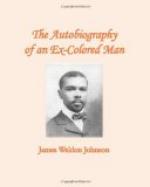The next morning I got out of the car at Jacksonville with a stiff and aching body. I determined to ask no more porters, not even my benefactor, about stopping-places; so I found myself on the street not knowing where to go. I walked along listlessly until I met a colored man who had the appearance of a preacher. I asked him if he could direct me to a respectable boarding-house for colored people. He said that if I walked along with him in the direction he was going, he would show me such a place: I turned and walked at his side. He proved to be a minister, and asked me a great many direct questions about myself. I answered as many as I saw fit to answer; the others I evaded or ignored. At length we stopped in front of a frame house, and my guide informed me that it was the place. A woman was standing in the doorway, and he called to her saying that he had brought her a new boarder. I thanked him for his trouble, and after he had urged upon, me to attend his church while I was in the city, he went on his way.
I went in and found the house neat and not uncomfortable. The parlor was furnished with cane-bottomed chairs, each of which was adorned with a white crocheted tidy. The mantel over the fireplace had a white crocheted cover; a marble-topped center table held a lamp, a photograph album and several trinkets, each of which was set upon a white crocheted mat. There was a cottage organ in a corner of the room, and I noted that the lamp-racks upon it were covered with white crocheted mats. There was a matting on the floor, but a white crocheted carpet would not have been out of keeping. I made arrangements with the landlady for my board and lodging; the amount was, I think, three dollars and a half a week. She was a rather fine-looking, stout, brown-skin woman of about forty years of age. Her husband was a light-colored Cuban, a man about one half her size, and one whose age could not be guessed from his appearance. He was small in size, but a handsome black mustache and typical Spanish eyes redeemed him from insignificance.
I was in time for breakfast, and at the table I had the opportunity to see my fellow boarders. There were eight or ten of them. Two, as I afterwards learned, were colored Americans. All of them were cigar makers and worked in one of the large factories—cigar making is one trade in which the color line is not drawn. The conversation was carried on entirely in Spanish, and my ignorance of the language subjected me more to alarm than embarrassment. I had never heard such uproarious conversation; everybody talked at once, loud exclamations, rolling “carambas,” menacing gesticulations with knives, forks, and spoons. I looked every moment for the clash of blows. One man was emphasizing his remarks by flourishing a cup in his hand, seemingly forgetful of the fact that it was nearly full of hot coffee. He ended by emptying it over what was, relatively, the only quiet man at the table excepting myself, bringing




